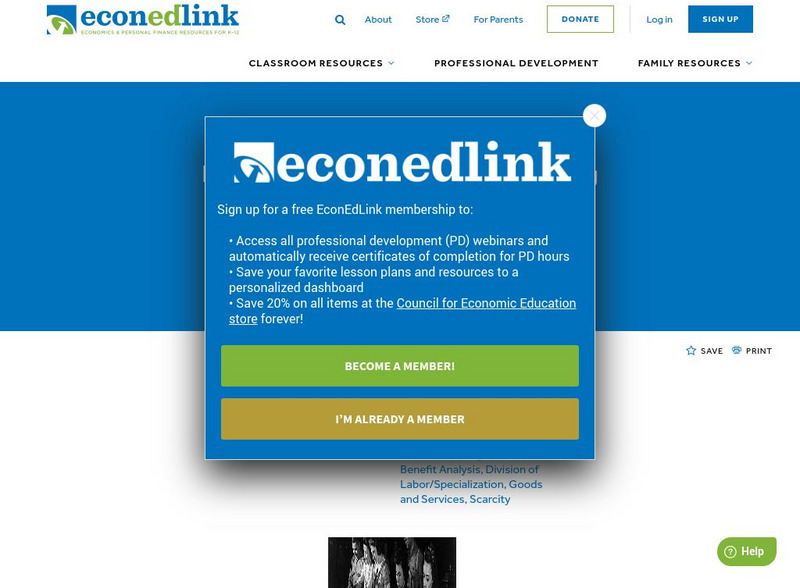Council for Economic Education
Econ Ed Link: Peanuts, Pecans, and Peas, Please
George Washington Carver, a great scientist, changed the economy of the South with his agricultural knowledge. This lesson will investigate how the lowly peanut kept the cotton farmers from losing everything.
Council for Economic Education
Econ Ed Link: Old Business, New Business
In this lesson students are introduced to several businesses from the past. They see that, while the names for these businesses are different, many of the elements of that job are seen in occupations today. The web site, "Business Cards"...
Council for Economic Education
Econ Ed Link: Work, Earnings and Economics: Using Lyddie by Katherine Paterson
In reading and discussing Lyddie, by Katherine Paterson, students examine basic economic concepts and explore the growth of labor unions and the role of government in a market economy.
Council for Economic Education
Econ Ed Link: Capital Chips (Part 2)
Through the use of a historical timeline of the capital investments made by the company the resulting benefits will be examined. The benefits from the capital investments of Herr Foods, Inc. will be related to their effect on the...
Council for Economic Education
Econ Ed Link: Capital Chips (Part 1)
Through the use of a historical timeline of the capital investments made by the company the resulting benefits will be examined. The benefits from the capital investments of Herr Foods, Inc. will be related to their effect on the...
Council for Economic Education
Econ Ed Link: Market Ability
Marketplace, a daily economics news program heard on National Public Radio, featured a story on January 8, 2002, titled "Microsoft Invades the Kitchen." In this segment, reporter Aaron Schachter describes consumers' enthusiasm, or lack...
Council for Economic Education
Econedlink: Economic Growth Video and Quiz
This video teaches the concept of Economic Growth. Economic growth refers to the ability of the economy to increase its total real output or real GDP, or its real output per person. The website contains an interactive quiz and links for...
Council for Economic Education
Econ Ed Link: Productivity Video and Quiz
This video teaches the concept of Productivity, which is measured as the quantity of output per unit of input. Watch the brief video and take the interactive quiz to assess what you have learned. [1.47]
Council for Economic Education
Econ Ed Link: Economic Spotter: Resources During World War Ii
In World War II pennies were made of steel and zinc instead of copper and women were working at jobs that men had always been hired to do. Why? Because during war times, scarcity forces many things to change!
Council for Economic Education
Econ Ed Link: Blowing in the Wind
Wind energy is becoming a viable alternative to more traditional forms of energy generation. In this lesson plan, students will determine the feasibility of wind generation in different areas of the United States. Finally, students will...
Council for Economic Education
Econ Ed Link: Transportation: They Say We Had a Revolution (Part 1)
Advancements in transportation have played a key role in the growth of our nation. U.S.government policies have also had a considerable impact on the development of transport as we know it today. In this series of three lessons, the...
Council for Economic Education
Econ Ed Link: The Mystery of the Amazing Farmers
In this lesson, you will be taking on the role of an investigative reporter to solve the Amazing Farmer Mystery. The goal will be to use seven clues provided throughout the lesson in order to figure out how so few farmers can produce...
Council for Economic Education
Econ Ed Link: Transportation: They Say We Had a Revolution (Part 3)
Advancements in transportation have played a key role in the growth of our nation. U.S. government policies have also had a considerable impact on the development of transport as we know it today. In this series of three lessons, the...
Khan Academy
Khan Academy: Acceleration
Acceleration, an increase in the rate of change, is occurring both in the Universe and in human culture on planet Earth. This article explains these fascinating changes.






